“You’re going to break my leg if you keep doing that,” said the young slave Epictetus to his master who was torturing him.
Then, with a horrible “SNAP!” the leg of Epictetus broke, causing him to walk with a limp for the rest of his life. Epictetus just kept looking at his master and calmly said, “Did I not warn you that would happen?”
And that is one reason why Epictetus is one of the greatest Stoic philosophers of all time. He dedicated his life to living out Stoicism, mastering his reactions and judgments to the world.
Stoicism is a form of philosophy that is very practical, providing a guide for us to live better through continuous self examination and betterment.
Epictetus told us to “devote the rest of your life to making progress” by relentlessly pursuing those virtues of character that are best and highest.
In fact, Stoicism was one of the precursors to modern cognitive behavioral therapy (and the earlier rational emotive behavior therapy). A foundational principle of both is recognizing the power within our mind, to interpret the world and what happens to us in a more favourable way.
Who was Epictetus?
Epictetus lived between 55 and 135 AD. He’s now known as one of the “big three” Stoic philosophers, along with Marcus Aurelius and Seneca. Born a slave, Epictetus was freed as a teenager, yet his early experiences caused him to pursue inner freedom—freedom from the bonds that society ties around most us as desire for wealth, power, and respectability. This book is a series of informal lectures that Epictetus gave, that only survived thanks to his student Arrian writing them down.
⚖️ 1. Control What You Can: Focus on what is within your control, become indifferent to what is outside your control
At the core of Seneca’s “Discourses” is a simple but extremely powerful idea: The key to inner peace is to distinguish between things we can control (like our own thoughts, feelings and actions) and things we can’t (like external events, the actions of others). Then we focus on changing what we can control and accepting what we can not.

Here’s a basic example.
Imagine you’re stuck in traffic. You start to feel frustrated, but then you remember this point of Stoic philosophy. You cannot control the traffic, but you can control what you focus on and how you interpret the situation.
So you choose to enjoy the music playing and see the situation as a much-needed break in the middle of a hectic week.
This mindset can be summed up in the saying, “Happiness is not having what you want, but wanting what you have.” Or, as the writer Henry David Thoreau said, “I can make myself rich by making my wants few.”
To include a more extreme example, I’d also like to share the story of Viktor Frankl, how he survived the Nazi concentration camps of World War 2 and then wrote down his experiences in the striking book Man’s Search for Meaning.
Essentially, Viktor Frankl was a successful psychologist that suddenly had everything taken away from him—all his family, his possessions, his social standing. Then he along with many other Jewish prisoners were starved and often worked to death.
In that most desperate situation, Frankl had the insight that “Everything can be taken from a man but one thing: the last of the human freedoms—to choose one’s attitude in any given set of circumstances, to choose one’s way.”
Read more in our summary of Man’s Search for Meaning by Viktor Frankl
In short, life is going to continue providing situations that we don’t like—pain, suffering, and chaos. But we can learn to master our mindset, our judgments and reactions to it. We can find inner peace by focusing on what is within our control and accepting what is not.
🌍 2. Embrace Reality: Finding peace within whatever circumstances that you’ve been given
James Stockdale was an American aviator whose plane was shot down during the Vietnam War. As he parachuted into enemy territory, Stockdale knew that he would soon be captured and thought to himself: “I’m leaving the world of technology and entering the world of Epictetus.”
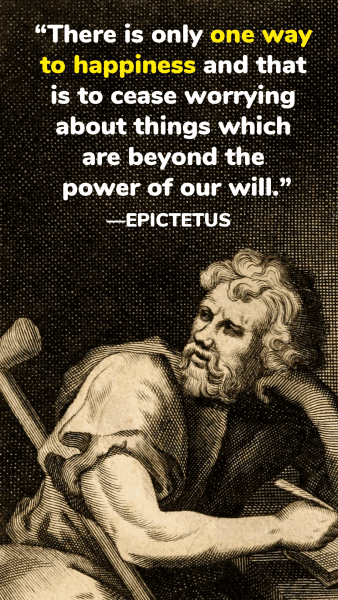
This signalled a shift in his mindset, towards fully accepting the circumstances he was about to endure. James Stockdale survived 7 years of being a prisoner of war in Vietnam, including 4 years in solitary confinement. His Stoic mindset was critical in helping him to remain emotionally in control, resist torture, and provide leadership and hope to his fellow prisoners.
Epictetus taught us to fully accept whatever reality is, whatever nature is, whatever God has decided for us. The art of living is not wishing that our circumstances were different, but making the best of the situation we find ourselves in. Even if that place is a prisoner of war camp.
Just like a card player can only play the hand of cards they’ve been given, to the best of their ability. It’s foolish for them to dwell on the fact they’ve been given an imperfect hand of cards.
Epictetus himself lived with a lame leg, a physical disability, for most of his life, and used it as one basis for his Stoic teachings. He believed nobody would ever choose illness or injury, but once we’re in that situation, we can choose to see opportunity in it.
Another great Stoic philosopher named Marcus Aurelius was a big believer in Providence. That means he believed that God or nature or some higher power is always providing us protection and care. This belief helped Marcus accept when bad things happened, because he viewed them as part of his inevitable destiny or happening for some higher unknown reason.
It’s kind of like swallowing bad tasting medicine from the doctor, we may not like it now but we trust it will help us. In the same way, Marcus always trusted there was some deeper reason for bad experiences, some painful lesson that nature wanted him to learn.
To sum it up, a core tenet of Stoicism is fully accepting our life situation, as if we had chosen it—because we only increase our suffering when we refuse to embrace reality. The art of living is playing the cards we’ve been dealt, trusting there is some deeper intelligence at work through nature.
⛰️ 3. Seek Approval Within: Finding inner freedom from the demands and expectations of society
“When someone is properly grounded in life, they shouldn’t have to look outside themselves for approval.”
—Epictetus
“You are not your job, you’re not how much money you have in the bank. You are not the car you drive. You’re not the contents of your wallet.”
—Chuck Palahniuk, Fight Club
Life catches us. We become attached to everything: our body, what we own, people around us. These things drag many people down, but with the right mindset we can regain inner freedom, even while living in the midst of society.
There are 2 major elements to this:
- Be careful who you spend time with. Epictetus tells us to beware the influence of crowds. We should associate with men of good character, whether living or dead (because we can find mentors through past authors). This is reflected in the saying, “You are the average of the five people you spend the most time with.”
- Don’t compare yourself to others. This is about simply doing our best, not abandoning our pursuits even if we’ll never be the best in it. For example, physical well-being is a good value to pursue even if someone will never have the body and proportions of Arnold Schwarzenegger.
Another major Stoic philosopher named Seneca taught a related idea: that getting more stuff would never satisfy us. Instead, we should go in the opposite way and learn to feel content with just a few things that are ‘essential’ and ‘enough.’ Seneca wrote, “Until we have begun to go without them, we fail to realize how unnecessary many things are. We’ve been using them not because we needed them but because we had them.”
Even 2,000 years ago, Seneca noticed people were no longer satisfied with a simple bathroom. They needed their bathrooms to fit the latest design trends like circular mirrors, fancy wall designs, and large windows—so they could tan while they bathed. Well, not much has changed today, has it?
Finding contentment is not about having more, but finding our approval within. Not comparing our efforts to others and controlling who we’re spending time with.
🌱 4. Pursue Virtue Without End: Becoming the best version of yourself takes time, just like a fig needs time to ripen
Patience truly is a superpower. Epictetus cleverly notes, “Nothing important comes into being overnight; even grapes and figs need time to ripen.” Let’s dive into this deeper…
To the Stoic philosophers, cultivating personal virtue was far more important than material success like wealth or fame. Virtue is about gaining control over ourselves and our minds, so our behavior conforms to a higher standard. In other words, becoming the best version of yourself. It’s not external goods, but our inner virtue that leads to tranquility, happiness, and freedom.

And that brings us back to patience, the king of all virtues. Why is patience the most important? Because it allows us to develop all the other virtues. The journey to personal greatness isn’t a sprint, but a marathon.
Sounds old fashioned? Not so fast. Modern scientific studies echo this ancient wisdom. Take the famous marshmallow experiment. Kids who could delay their gratification by not eating one marshmallow for a while in order to get two marshmallows later? They generally ended up being more successful in life. Patience, it seems, is indeed a virtue.
But how do we get started? Epictetus advises us to start small.
“We should discipline ourselves in small things, and from there progress to things of greater value.”
—Epictetus
This idea is reinforced by the modern bestseller Atomic Habits by James Clear, which says “Decide the type of person you want to be. Prove it to yourself with small wins.”
Small habits like making our bed each morning seem insignificant, but their impact can be life-changing, when repeated daily. Just like changing the course of a plane by just a few degrees can make the difference between landing in Alaska or Argentina.
In short, pursuing ever-greater inner virtue is far more valuable than external material things for our long term well-being. The king of virtues is patience, being able to delay gratification, achieving small daily wins until we reach our long-term goals.
🏋️ 5. Level Up With Challenges: Like Hercules, embrace obstacles as an opportunity to get stronger
Think of the legendary Greek hero Hercules, celebrated for the unparalleled strength and courage, as he slayed one monster after another, including the many-headed Hydra.
Epictetus asks a provocative question: who would Hercules be without facing those gruelling trials? He’d be nobody. Without a challenge, Hercules would have simply rolled over in bed and gone back to sleep.
In the same way, we can perceive adversity in our lives as a tool for growth and learning. This comes back to the core Stoic idea that we can choose to interpret external events in a way that is more empowering and hopeful.
Challenges in our lives are inevitable, but how we face those challenges is a choice that we make.
Living in Greece, Epictetus was a big admirer of the athletes that competed in the Olympic Games. He often used athletes to illustrate principles of Stoic philosophy. To become better, and athlete needs to be continually competing against other athletes that are a little better than them. Or as the book of Proverbs in the Bible says, “As iron sharpens iron, one man sharpens another.”
If there’s one man that embodies Stoic philosophy today, it must be David Goggins. He was almost one hundred pounds overweight, working in an rat exterminator job he hated, dealing with the trauma of abuse and racism… then transformed himself into a Navy SEAL and ultramarathon runner. Later he wrote a book about his life journey called “Can’t Hurt Me.”
One of the most important principles that David Goggins writes about is “callousing your mind.” He believes that by pursuing difficult challenges, we can harden our inner self discipline… just like our hands can get hard and calloused when we do hard physical work. So his whole approach is to proactively seek ever greater challenges, “brainwashing himself to crave discomfort.”
To sum it up, rather than getting upset about life’s unexpected obstacles, we can choose to see them as an exciting opportunity to level up our strength and competence.
🧠 6. Reason Over Reaction: Building emotional self-mastery through checking our impressions and judgments
“Any person capable of angering you becomes your master.”
—Epictetus
We’ve all had situations where we’ve done something we regretted, like saying something hurtful in reaction to someone else or indulging a bad habit a little too much. These mistakes are part of being human, but Epictetus says we can learn to make fewer of those mistakes in the future, by relying on our reason to harness our impulses.
- Reason. This distinguishes humans from other animals; we have a greater ability to step back and assess a situation before acting. 2000 years later, this was one of psychologist Viktor Frankl’s major points when he wrote, “Between stimulus and response there is a space. In that space is our power to choose our response. In our response lies our growth and our freedom.”
- Impressions. Epictetus invites us to stop trusting our impressions, those instant reactions to events around us. Instead, we can inspect our impressions carefully, to make sure our perceptions truly reflect reality, free of major biases and fears. Imagine a money changer in Ancient Rome, who would clang each coin on a table, being able to tell from the sound whether the coin was real or false. That’s how meticulously we should check each mental impression.
- Judgments. The next step is to understand it’s not events alone that upset us, but our judgments about them. For example, when there is a rainy day, why does one person feels frustrated but another person feels thrilled by it? It’s the same rain, only their inner judgments about it are different. To become our own master, we must check our judgments.
- Learning and freedom. Finally, to change our old emotional habits, we must be open to learning. As Epictetus wrote, “A person is not going to undertake to learn anything that they think they already know.” If we can acknowledge our ignorance with humility, then we open a space to change our old judgments and reactions. And that’s the path to inner freedom.
In a nutshell: Rise above impulsive reactions by double-checking each impression and judgment, stripping out irrational fears and biases. Then life will transform from a rollercoaster of pain and pleasure, into a focused pursuit of rational living.
⏳ 7. Death and Impermanence: Accepting the fact we were born to die
A final major Stoic principle is called “memento mori,” that means “remember death.” When we embrace the fleeting nature of life, we immediately gain a higher level of inner freedom, clarity, and focus. Contemplating one’s death sounds like it should feel grim, almost depressing, but in Stoicism it is the most liberating practice there is.
Everything we stress about, the people we’re worried to impress, that grudge we’ve been holding onto—all become insignificant when faced with the inescapable reality of life and death.
Nobody said it better than Steve Jobs, the cofounder of Apple who delivered a striking speech at Stanford University in 2005, soon after being diagnosed with a rare form of cancer. He said, “Remembering that I’ll be dead soon is the most important tool I’ve ever encountered to help me make the big choices in life. Because almost everything — all external expectations, all pride, all fear of embarrassment or failure — these things just fall away in the face of death, leaving only what is truly important. Remembering that you are going to die is the best way I know to avoid the trap of thinking you have something to lose. You are already naked. There is no reason not to follow your heart.”
Marcus Aurelius, the Stoic philosopher who was also the Emperor of Rome, an extremely high-pressure position, often thought about his death to achieve greater emotional stability. He would often remind himself that he would be dead soon, and everyone who ever knew him would be dead, too. Marcus Aurelius used strong visual language to help the point sink in, telling himself that he would soon be bones or ashes in the ground. This he found to be the best cure to worrying about what others think of him.
In short, death is a fact of life. At first, that sounds grim, but the Stoics like Epictetus believed that reminding ourselves of our deaths regularly leads the way to emotional stability and freedom.
- Say the Serenity Prayer. “God, grant me the serenity to accept the things I cannot change, the courage to change the things I can, and the wisdom to know the difference.” Even if you’re not religious, this short phrase is a perfect reminder of the core Stoic principle of control.
- Avoid comparison. Focus on your own progress, not where you stand compared to others. Put your energy into always doing your best to embody those virtues you desire to have, don’t despair of never being #1.
- Discipline yourself in small things. This is the path to progress in developing the great virtues like patience and tranquility.
- Pause. Before reacting, question your judgments and reactions. Check if your feelings come from a skewed interpretation of the situation, similar to cognitive behavioral therapy exercises.
- Contemplate death. Regularly remind yourself of life’s impermanence to stay grounded and focused on what truly matters.

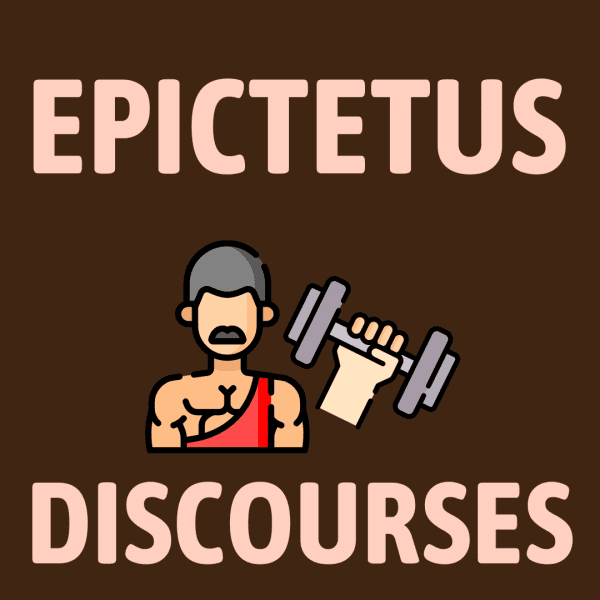
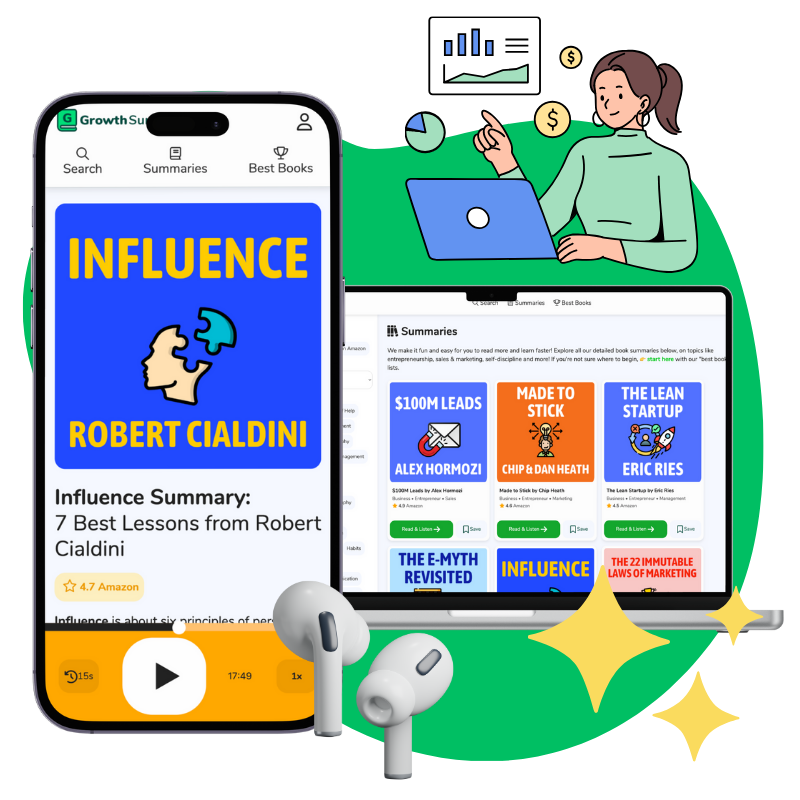
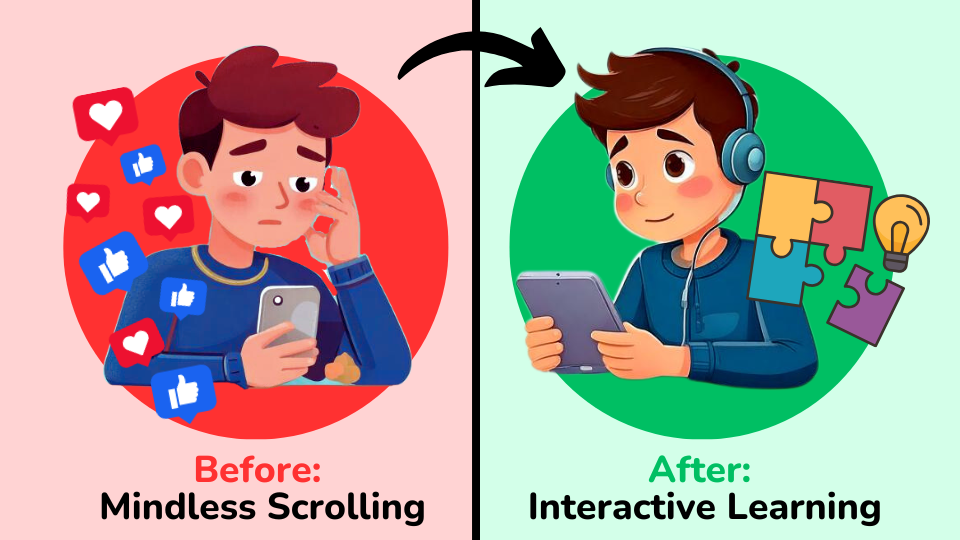








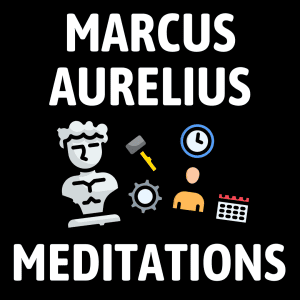
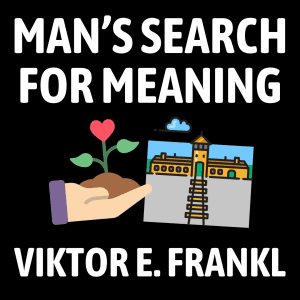
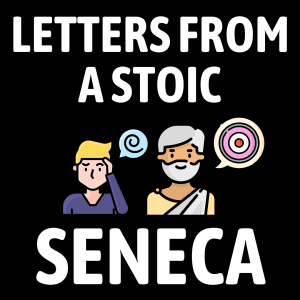
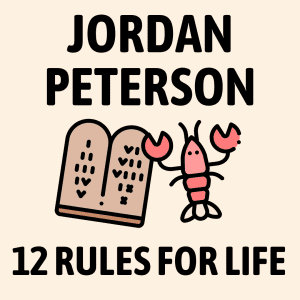
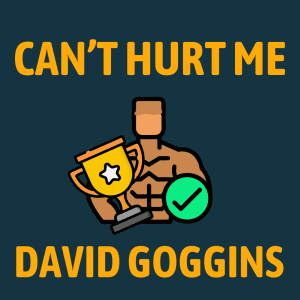
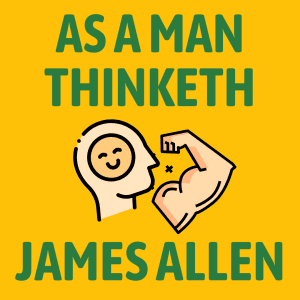
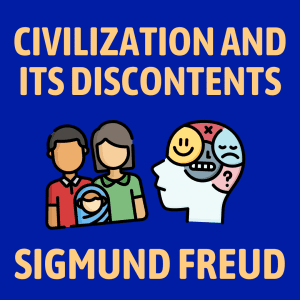






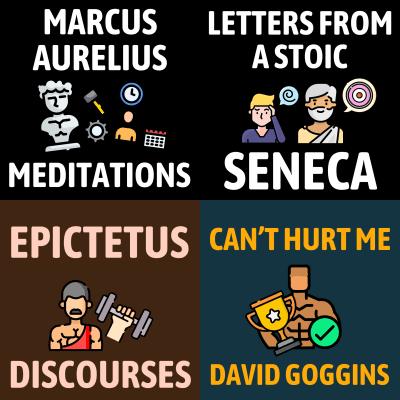

Community Notes